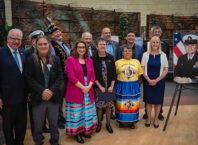An American Indian language-immersion program is getting a boost from William Mitchell law students, who are helping to get legal permission to translate children’s books.
“Mukwa!” shouts a class full of children when shown a picture of a bear.
The “ogi” (Ojibwe for teacher) flips through a picture book while a group of 4- and 5-year-olds tries to guess the name of the animal shown on the page.
The class held at the Anne Sullivan Communications Ctr. in Minneapolis is the same as other kindergarten-readiness programs, but for three hours every day, it is taught in the American Indian Ojibwe language. Next door, a class is taught in the Dakota language.
Resources for American Indian language-immersion classes are in short supply, but thanks to the work of local law students, legally translated children’s books are on the rise.
In the past, the Alliance of Early Childhood Professionals (AECP) translated children’s books on their own, taping Indian translations over English type. Now, the translated versions are being published.
“When they’re published books, it makes (Dakota and Ojibwe) equal languages,” said Joe Sisokaduta, a Dakota speaker who helps translate books. The makeshift books seemed to devalue the languages, Sisokaduta said.
Margaret Boyer, director of the AECP, wanted to share the translated works but worried about copyright issues. Last year, she contacted Jay Erstling, director of the William Mitchell College of Law Intellectual Property Clinic in St. Paul, who was thrilled to help. He expected copyright holders to share his excitement.
“I thought it would be a slam-dunk, but it’s been a more difficult and lengthy process than I imagined,” Erstling said.
Although the AECP’s Wicoie Nandagikendan Urban Immersion Project has translated more than 120 books, it has gotten permission to share only four of those translated books with other programs. Wicoie also can share seven books written by members of the American Indian community.
Some publishers don’t understand the nature of the project or recognize the need; Erstling says that’s because few American Indians live in Manhattan, where many publishers are located.
“The Indian community here is very important,” Erstling said. “We do live pretty much in Indian country.”
Besides seeking permission to translate books, one thing the law students have been looking at is the possibility of drafting an amendment to federal copyright law.
Currently, books can be translated into audio books or Braille for educational purposes without seeking permission from copyright holders, said Bob Larson, one of the law students working on the project. Something similar might be possible for the purpose of teaching American Indian languages.
While the law students focus on the “robotic and routine” process of finding out who owns copyrights and seeking permission to translate, others work on the actual translation.
Every Wednesday night, Amber Ruel, the ogi at Anne Sullivan, drives to the Mille Lacs Reservation to talk with the elders, or “first speakers,” those whose first language is Ojibwe, in order to learn new words for translation. She stays there from 7 to 11 p.m., drives back to Minneapolis and then teaches class in the morning.
“It’s a total labor of love,” Ruel said. Since first speakers are in short supply, Ruel said she “feels the time crunch.”
Boyer estimates 300 to 400 Ojibwe first speakers are left in Minnesota and only nine who speak Dakota.
The language-immersion project, which has served 208 children, has three classes in Minneapolis and one on the Leech Lake Reservation.






